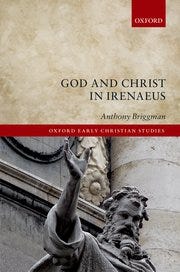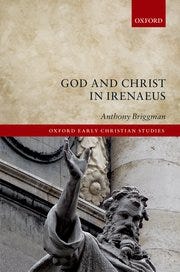I’ve been reading Anthony Briggman, God and Christ in Irenaeus (Oxford Early Christian Studies: Oxford: OUP, 2019).
Briggman offers new perspectives on Irenaeus' understanding of the divine being, the relationship of the Son to the Father, the “mixing” of divine and human natures in Jesus, and a fresh exploration of Jesus’s salvific work. It's probably the best thing I’ve read on Irenaeus since Eric Osborne!
Irenaeus is rightly regarded as the first “biblical theologian,” and AH 2.25-28 furnishes us with Irenaeus’ theological method which is thoroughly scriptural. Nonetheless argues Briggman, Irenaeus does not avoid metaphysics. I concur with this judgment because, as I’ve argued in Jesus among the gods, concern with ontology, exploration of a divine nature, was already in the air in philosophy and the theorizing of ritual during the first and second centuries. Furthermore, given the metaphysical speculations of the Gnostics against whom Irenaeus wrote so much, it would be entirely appropriate for Irenaeus to work out or note in passing his own metaphysical commitments.
On christology, Briggman thinks Irenaeus attributes to the Word/Son “an eternal, distinct existence essential to the divine being” (105). Such is the result of a “reciprocal immanence” whereby “the Son is in the Father and has the Father in himself,” otherwise known as coinherence or perichoresis. Briggman also sees Irenaeus as intimating the notion of the Son’s “eternal generation.” True, Irenaeus did see in Isa 53:8 (“Who can speak of his origins/generation?”) a warning against speculations as to the Father’s “production” of the Son (as did the later Arians!). Yet Briggman notes that Irenaeus is not arguing for agnosticism on the Son’s “production,” only that “divine generation must be understood in a way that according with the principle of divine simplicity and its corollary of atemporality, such that any concept of the Word-Son’s generation that is temporally conditioned is inappropriate” (125). Since the Son for Irenaeus comes from God as “light from light,” an eternal effusion of luminous glory from the Father, when put in filial terms, that requires the eternal generation of the Son. This accords with Irenaeus’ remark in Pref. 47:
“Therefore, the Father is Lord and the Son is Lord, and the Father is God and the God is God, since He who is born of God is God, and in this way, according to His being and power and essence, one God is demonstrated.”
For Briggman, then, Irenaeus not Origen is the first to affirm the eternal generation of the Son.
Briggman argues too that Irenaeus is also influenced by Stoic mixture theory concerning the union of divinity and humanity in Jesus.
While this book is somewhat technical and a serious monograph about Irenaeus, for anyone committed to the study of second century Christianity, this is a terrific read and will hopefully impact the study of Irenaus in the future.





Wonderful!! I learned some interesting things about this beloved Church Father!